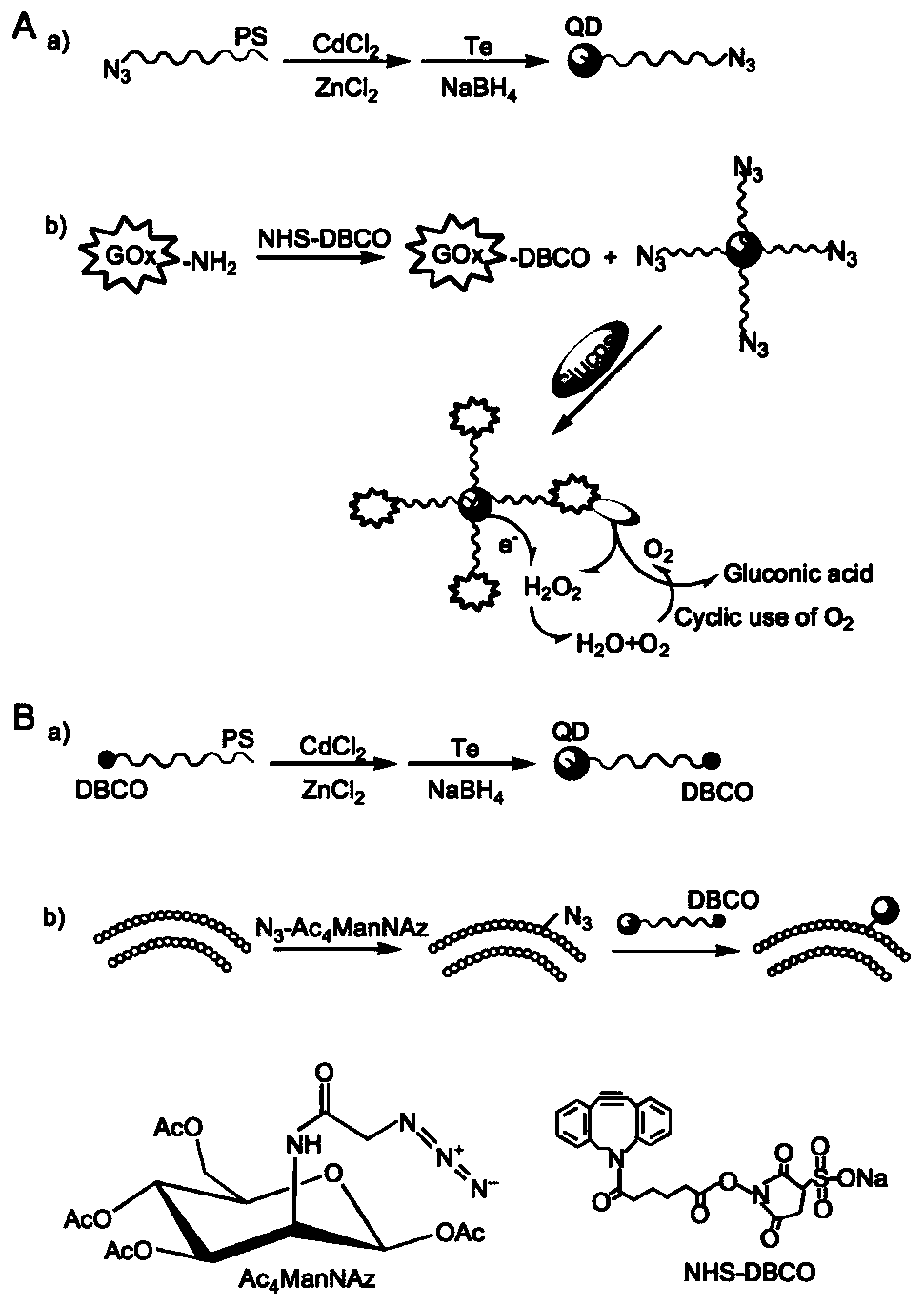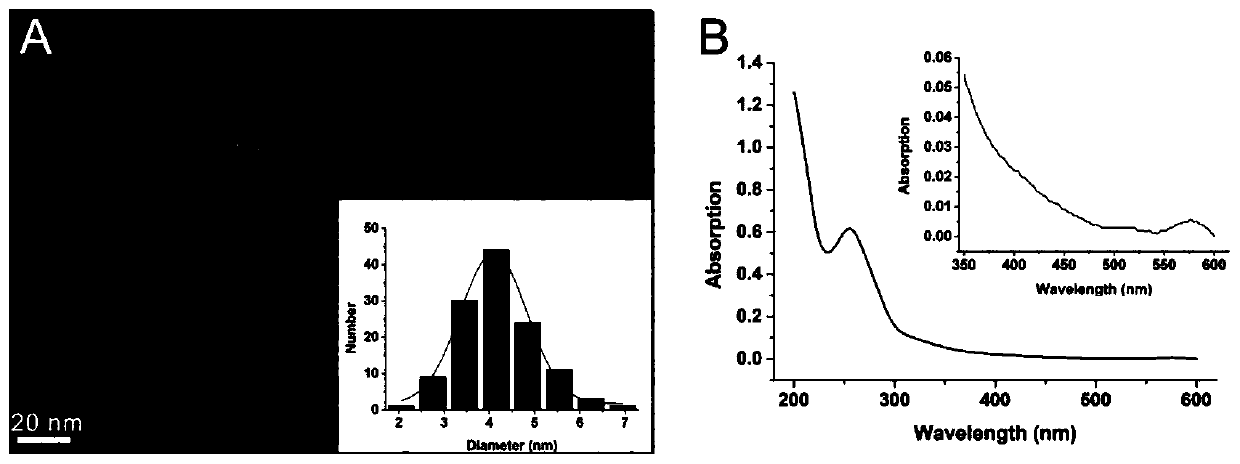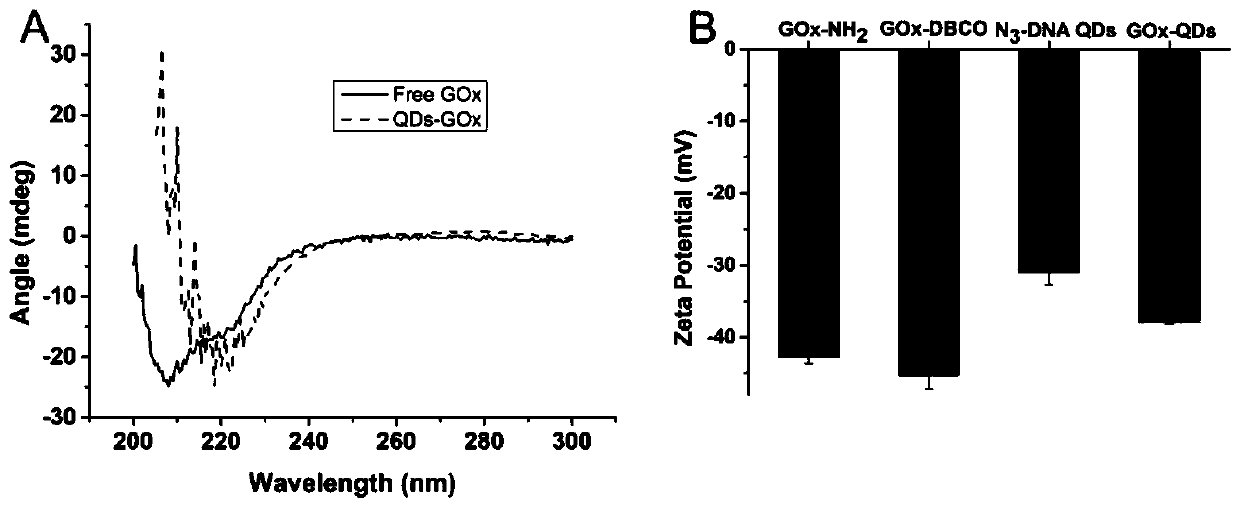A preparation method of DNA functionalized quantum dots based on click chemistry and its application in biomarkers and detection
A quantum dot and functionalization technology, which is applied in the fields of nanomaterials and biomedical analytical chemistry, can solve the problems of single functionality of quantum dots, and achieve the effects of high labeling efficiency, fast labeling speed and high connection efficiency
- Summary
- Abstract
- Description
- Claims
- Application Information
AI Technical Summary
Problems solved by technology
Method used
Image
Examples
Embodiment 1
[0041] The features and advantages of the present invention can be further understood through the following detailed description in conjunction with the accompanying drawings. The examples provided are only illustrative of the method of the present invention and do not limit the remaining content of the present disclosure in any way. [Example 1] An azide-modified DNA functionalized CdTe:Zn 2+ Preparation method of quantum dots
[0042] Its preparation method comprises the following steps:
[0043] 1) Dissolve 0.025mmol cadmium chloride, 0.025mmol zinc chloride and 0.05mmol N-acetyl-L-cysteine in deionized water to obtain mixed solution A, adjust the pH value of mixed solution A with sodium hydroxide solution to 9.0; take 0.01mmol sodium tellurite and 0.005mmol sodium borohydride, add it to a 10mL single-necked flask, place it in an ice bath and react for 5 hours under anaerobic conditions, and it is mixed solution B; quickly transfer mixed solution B into mixed solution I...
Embodiment 2
[0047] [Example 2] An azide-modified DNA functionalized CdTe:Zn 2+ Quantum dots for glucose oxidase labeling method
[0048] Its marking method includes the following steps:
[0049] First, glucose oxidase (GOx) was modified with DBCO. Weigh 0.5mg NHS-DBCO reagent, add 20μL DMSO to dissolve; then weigh 10mg GOx, dissolve in 500μL Tris-HCl buffer solution (pH 7.4, 20mM), add NHS-DBCO reagent dissolved in DMSO to the above GOx solution, and react overnight. The above reaction solution was subjected to centrifugal ultrafiltration with a 30KD ultrafiltration tube, the ultrafiltration time was 10 min, and the rotation speed was 5000 rpm. Finally, the GOx-DBCO solution obtained by ultrafiltration was added to the N 3 -DNA functionalized CdTe:Zn 2+ In the QDs solution, react for 4h, then use a 100KD ultrafiltration tube to carry out centrifugal ultrafiltration to the above reaction solution, the ultrafiltration time is 10min, and the rotating speed is 5000rpm. The obtained GOx-...
Embodiment 3
[0051] [Example 3] A glucose oxidase-quantum dot (GOx-QDs) complex is used for the method of glucose detection
[0052] Its detection method comprises the following steps:
[0053] Take 10 μL of GOx-QDs (400 nM) prepared in [Example 2], add different concentrations of glucose, and add 20 mM Tris buffer (pH=8.4) to make the total volume of the reaction system 400 μL. The mixed solution was reacted at room temperature for 30min, and then, its fluorescence spectrum was measured with 350nm as the excitation wavelength.
[0054] Such as Figure 4 As shown in A, the fluorescence of quantum dots gradually decreases with the increase of glucose concentration. Such as Figure 4 As shown in B, within a certain concentration range, the fluorescence of quantum dots has a linear relationship with the concentration of glucose, the linear range is 0.1-20μM, and the detection limit is 0.017μM.
PUM
 Login to View More
Login to View More Abstract
Description
Claims
Application Information
 Login to View More
Login to View More - R&D
- Intellectual Property
- Life Sciences
- Materials
- Tech Scout
- Unparalleled Data Quality
- Higher Quality Content
- 60% Fewer Hallucinations
Browse by: Latest US Patents, China's latest patents, Technical Efficacy Thesaurus, Application Domain, Technology Topic, Popular Technical Reports.
© 2025 PatSnap. All rights reserved.Legal|Privacy policy|Modern Slavery Act Transparency Statement|Sitemap|About US| Contact US: help@patsnap.com



